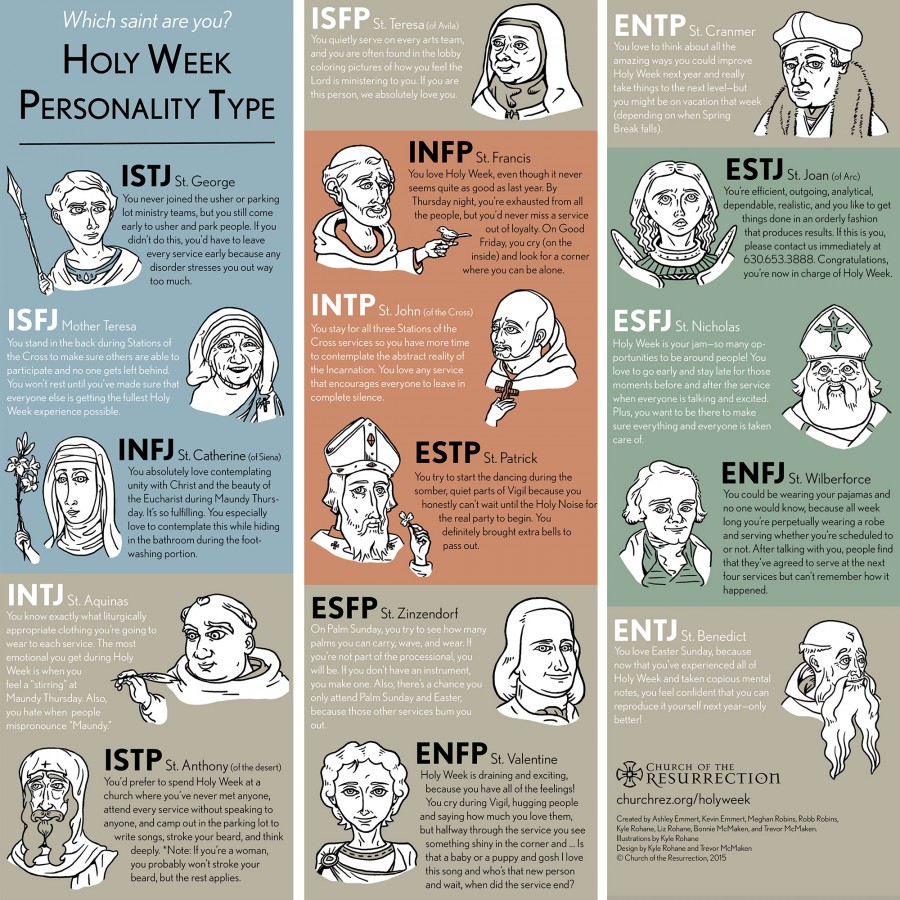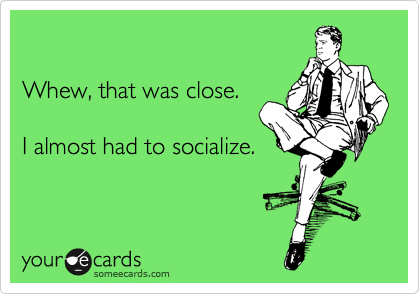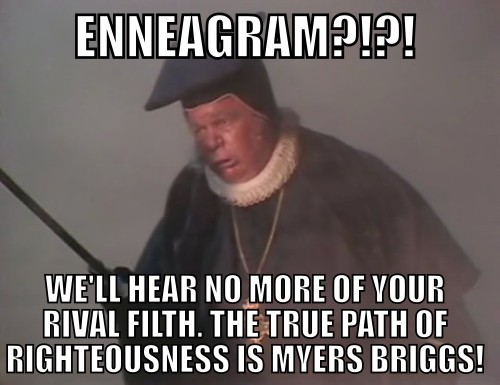

In seminary there were three really important questions you asked your fellow students:
- What diocese are you from? (New York)
- Sherry or Port? (Lemon-tini)
- What is your Myers Briggs? (INFJ)
I haven’t figured out if Myers Briggs was a part of the Gnostic gospels or the Apocrypha, but it is a fundamental personality identifier in mainline Protestant seminary culture. So it must be in the scriptures somewhere. As a J, I can tell you that it was the fastest way to sort out the weirdos from the weirdest. And also, it was a great way to preemptively excuse your bad behavior. Once I learned my Myers Briggs, I could say whatever I wanted. It was like the “God put it on my heart to tell you…” of liberal Christianity. As long as I reminded people that my INFJ plight makes me “decisive and strong-willed” or “easily mistaken for an extrovert,” I could dole out all kinds of insistent and unwanted opinions.
The first time I began to question the overreach of the Myers Briggs in church world, I heard a story about a couple in marriage counseling who were hashing out their differences. The husband was an Episcopal priest. And each time the wife would ask him to answer for something he had clearly been wrong about, the husband would reply, “But honey! You know I’m an INFP.” Finally, the wife got fed up and replied, “Don’t you mean J-E-R-K?”
 This story hit me particularly hard because I had hauled out my Myers Briggs personality type anytime I wanted to get my way. I especially loved to bring up the I for introvert. But like a lot of things one learns in seminary, the Myers Briggs was of zero use in the parish. Nobody cares that you are an introvert. You are an adult. You cannot just say the phrase “I am an introvert” to end a conversation at coffee hour.
This story hit me particularly hard because I had hauled out my Myers Briggs personality type anytime I wanted to get my way. I especially loved to bring up the I for introvert. But like a lot of things one learns in seminary, the Myers Briggs was of zero use in the parish. Nobody cares that you are an introvert. You are an adult. You cannot just say the phrase “I am an introvert” to end a conversation at coffee hour.
I mean you can. And I have. But it’s weird for everyone when you do that. When my husband was called to his most recent parish I can remember the first few months involved a tremendous amount of social time. And once, just once, I interrupted his conversation with a parishioner by saying, “I’m an introvert, I need Lonely Time, and so we’re going to need to wrap this up,” complete with a circle in the air finger move like they do in bars while saying, “You don’t have to go home, but you can’t stay here.”
I know, I’m still waiting for the Clergy Spouse of the Year Committee to call me about the Pastoral Presence Prize.
The parishioner looked dumbfounded. My husband looked a little weary of me. And I thought to myself, “That worked much better at seminary.”
So, for a while now, I’ve been not buying into this personality type mumbo jumbo. I’m a sinner in need of redemption. And I’m loud, impatient, and anxious in social situations. See also the first part of my self-description.
 And then a friend suggested to me that I take the Enneagram test. And I hated the results. I was angry with said friend for even asking me to take it. Mostly, because the Enneagram allows you to have a fuller picture of yourself. It lays out your positive attributes, for sure. But it also tells you those things about yourself that you most want to hide. And if an online test can recognize all of my neuroses then surely everyone is seeing them too.
And then a friend suggested to me that I take the Enneagram test. And I hated the results. I was angry with said friend for even asking me to take it. Mostly, because the Enneagram allows you to have a fuller picture of yourself. It lays out your positive attributes, for sure. But it also tells you those things about yourself that you most want to hide. And if an online test can recognize all of my neuroses then surely everyone is seeing them too.
The Enneagram also has a specific component called Childhood Wounds. Now, the human being in me wants to deny that such a thing exists in people. Because then I would have to admit it exists in me. But the pastor in me knows that everyone does indeed have a woundedness from childhood. Some of us felt neglected. Some were loved by way of achievement. One of my mentors used to say that the church was a building full of “wounded children.” And there were my Enneagram results in total agreement.
I’m not advocating that we all define ourselves by yet another personality test. But I am suggesting that we take a harder look at the worst versions of ourselves. Why do certain sins in my life continue to perpetuate? What is it about me that clings to judgment? How does my past live on in my present?
This is what we do in therapeutic settings. And it is certainly what we are called to do as sinners freely redeemed from our sinfulness.
The wild mechanics of grace are most definitely at play here. The mirror is held up, the curtain has come down, and God still loves me anyway. When I am no longer self-justifying my sin, then I have more space to see my heart. When I am not banging the noisy gong of defensiveness about my behavior, then I begin to marvel at a God that has forgiven all of me.

COMMENTS
7 responses to “Personality Assessments: Grace in Neuroses”
Leave a Reply














I, your sister in INFJ, love this.
Karen! That’s so funny. And thanks.
I loved this, Sarah! Thank you . So true that we tend to justify our sins by hiding them behind personality!
I do also relate more to the Enneagram. Thanks for this.
I used to jokingly bring up my INTP label given me 30 years ago at seminary with interns as a way of mocking what they had heard even now at seminary about their own personality types. My label had the counselor working extra hard trying to convince me that the ministry would not be for someone like me, because less than .04 % of pastors had that personality type. Grace does strange things even through someone as sinful and imperfect and introverted as me. Thanks for taking a swipe at the silliness.
I have heard Meyers Briggs results called “Episcopal astrology,” and this wounded child of a therapist likes that a little bit too much.
I’ve always liked the simplicity of the ancient four personality types as learned via Florence Littauer. What you learn first does tend to color all future thinking. Regardless, the danger comes in viewing whatever the identifier as being a point of pride or a fatalistic excuse for ourselves or others. Frankly, the most preferable assessments for a Christian’s inner-tickings should focus on the gifts of grace found in Romans 12:3-13. These motivational gifts help us to “think not too highly of ourselves and with sober judgement” (v. 3).